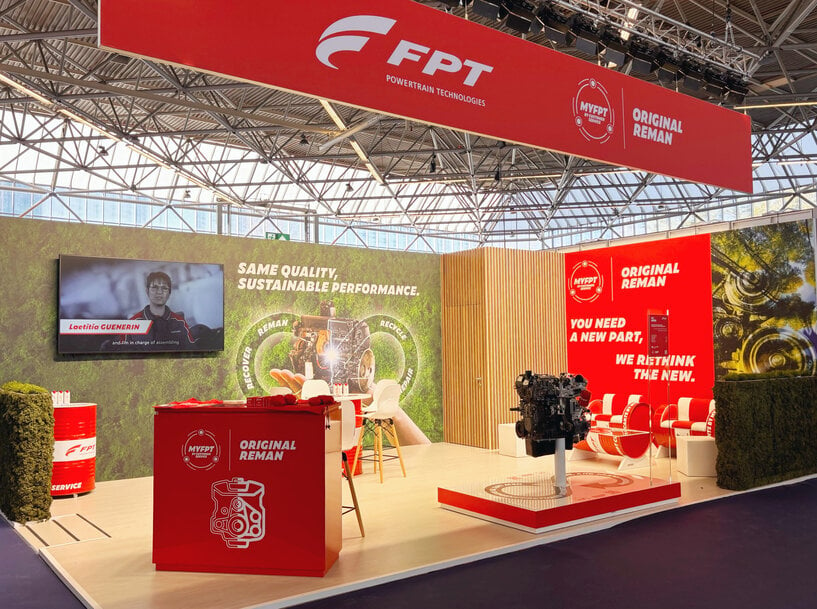FPT INDUSTRIAL TAKES CENTER STAGE AT REMATEC 2025, SHOWCASING ITS ORIGINAL REMAN SOLUTIONS
FPT Industrial showcases its leadership in Original REMAN Solutions at REMATEC 2025, presenting its expanded range of remanufactured engines and components at a double-sized stand.
www.fptindustrial.com

During Rematec, the brand will also take center stage in two key sessions. The first – taking place on April 9th from 1:30 to 2:00 p.m. – is a conference focused on the FPT Industrial Original Reman business & products. The second, entitled “Panel Circular & Sustainable Vehicles” (April 9th, 4:00 – 5:00 p.m.), will see FPT Industrial and other companies exploring the trends, developments, and technologies in the design, production, and end-of-life treatment of sustainable vehicles. Both sessions will be held at the Rematec Theatre.
FPT Industrial’s commitment to sustainability is reflected in the stand’s design, which prioritizes eco-friendly materials such as recycled wood and green elements. It also features upcycled furniture made from repurposed oil drums, further showcasing the Brand’s dedication to the circular economy. At the stand, visitors will have the chance to see a remanufactured F1C engine – the 3.0 l Common Rail diesel engine for on road applications – split in half to show a cross section highlighting the quality of the Reman product and regeneration process. Visitors will also have the possibility to embark on a virtual journey through the Garchizy FPT Industrial Reman plant, gaining an up-close view of the processes and technologies behind remanufacturing of engines, transmissions and components.
EXPLORING THE CIRCULAR ECONOMY THROUGH FPT INDUSTRIAL'S EYES
As the world shifts towards a circular economy, remanufacturing has become a cornerstone of sustainable industrial practices, extending the service life of vehicle components while significantly reducing waste and emissions. FPT Industrial fully embraces this approach, integrating sustainability with uncompromised quality and safety. By choosing remanufactured parts, businesses not only benefit from cost savings, but also actively contribute to conservation of resources and environmental responsibility.
FPT Industrial achieves these results through a highly advanced remanufacturing process, where each genuine component undergoes a rigorous six-stage process. First, each component undergoes detailed disassembly and evaluation to identify opportunities for product improvement during the inspection phase. Next, custom-designed eco-friendly cleaning processes are used to ensure thorough cleaning. The components then go through a comprehensive inspection and conformity check by experts and subsequent functional analysis in the component certification stage to meet the required standards. In the remanufacturing phase, components are enhanced/renewed through mechanical upgrades, product improvements, and the integration of new parts when necessary. Expert reassembly follows, ensuring the highest quality and performance by combining remanufactured components with new parts. Finally, tailored testing at 100% load is conducted to verify that the remanufactured components meet the same performance standards as new parts, ensuring their reliability.
This meticulous process guarantees that every part meets the original performance standards, delivering the same reliability as new components. Through strict quality controls and innovative production techniques, FPT Industrial Original Reman delivers high-performance solutions with a lower Total Cost of Ownership (TCO), a two-year warranty, and reduced machine downtime, maximizing both efficiency and sustainability.
The remanufacturing process takes place at Garchizy, France, the company’s central Reman hub, alongside sites in Turin, Italy. Here, expert teams inspect and restore 12,000 engines and transmissions, and 22,000 spare parts annually. Through the recovery of key components, the FPT Industrial Original Reman enables energy savings of 80% compared to new production, and prevents 28 million tons of CO₂ emissions annually – the equivalent of 350 tankers of crude oil, the electricity produced by eight nuclear power plants, and enough gasoline for six million cars.
www.fptindustrial.com


